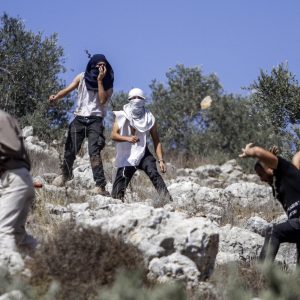– by Yahav Zohar –
A group of young men walk down a rocky slope. They are wearing white, their sabbath clothes, moving in loose formation towards a shepherd and a grazing herd of sheep, or a farmer tending his olive trees. As they come closer, some of them cover their faces with makeshift masks so as not to be recognized if a complaint is ever filed with the remarkably inept local police force. One of them is showing a pistol in his belt, but this is usually not drawn. Others are armed with heavy sticks, sometimes even a slingshot of the type their Palestinian neighbors use. Sticks and stones may actually come into use, but first it is shouting, threats, shoves, get out of here, get away, go back to your village. They are here, in their mind, to protect their territory, their hilltop settlement or outpost, from any encroachment. Sometimes these incidents will end with the threatened party escaping mostly unharmed, or with violence directed at the sheep or olive trees, other times there will be beatings. Guns are rarely drawn, and almost always the goal is achieved, Palestinians are driven away. Away from their grazing land, away from their olive orchards, away from constantly expanding circles around settlements and outposts, clearing space for further settler expansion and affirming the order of things, of who is master, divinely ordained ruler of these hills, and who is at best subject, tolerated as laborer and servant as long as he stays meek and obedient.

Cellphone cameras are everywhere and though the beatings often target those filming, and many times phones have been smashed with rocks to destroy the evidence, videos like this are ubiquitous, and a simple YouTube or Google search will garner many. Often in these videos you might see Palestinians arguing with their attackers. Insisting that this is their land, their orchard, before they are pushed away or beaten. Occasionally you might even see Palestinians shoving back those who are advancing on them, but very rarely will they use more force. It’s not just that they are outnumbered by the settlers, or that they are nonviolent by ideology. To really understand what’s happening in these videos one has to zoom out, quite literally, and look up the slope, at the more distant figures looking on from above. Cellphone cameras are not great for showing distant figures, but 50 or 100 meters away, looking on, are almost always some Israeli soldiers. Posted to guard the settlement and the settlers, they follow along when a group of young men wanders out to the surrounding countryside. It is not their mandate to stop the settler from going anywhere or doing anything. Their duty, as their commanders drill into them, is first and foremost to protect Israeli citizens, and the only citizens in this scenario are those with the covered faces, with the crowbars and slingshots. If anyone were to pose a threat to the lives or wellbeing of any of these Israeli citizens, the soldiers are there within firing distance, ready to shoot.

Israeli Prime Minister Naftali Bennet has recently proclaimed that settler violence is ‘insignificant’. In many ways, he is correct. Israeli settlers, after all, are a small minority in most of the West Bank, and these young men going out to raid and threaten their neighbors are a small minority among the settlers. Ultimately, their violence, driven by a racist ideology backed up with religion, would not be a major threat without the military to back them up. And in the big picture, many more Palestinians are injured or killed by the Israeli military than by settlers. It is the military that regularly raids villages, knocking down doors and terrorizing families in the middle of the night to make arrests, or to protect the bulldozers that come to demolish homes. The vast majority of the violence is policy, set out by politicians, passed on through military commanders and carried out by soldiers. Israeli human rights organization B’tselem counts 3844 Palestinians killed by the Israeli military since 2009, and only 30 killed in the same period by Israeli civilians. Certainly, settler violence is not the main danger to Palestinians, nor is it really separate from state violence which it could not exist without.
But while the violence of the state is wrapped up in a language of security, of necessity, of self-defense, settler violence makes no pretenses. The land, the whole land, belongs solely to Jews by divine providence, and so any Palestinians are a possible target, though usually those who come too near, who are ‘uppity’, who point cameras at their would-be assailants, who insist on their rights to their own orchards, their own grazing land. Here violence is a pure and straightforward means of establishing ethnic dominance, of instilling fear. The military backs this violence up, and the police which is supposed to investigate it almost always comes up empty handed, unable to identify the culprits or uninterested in doing so. The recent comments by the Israeli Public Security Minister condemning settler violence have met with attacks from other ministers and MKs denying that such violence even exists or, like the Prime Minister, claiming it is insignificant. Many in the opposition and even within the government have attacked minister Bar Lev for hate speech against the hundreds of thousands of law-abiding settlers. These attacks are intended to maintain the image of Israeli rule as fair and rooted in self-defense, and more particularly to dissuade the minister from forcing the West Bank branch of the police to actually identify culprits and press charges. In Israeli public discourse, even mentioning settler violence is dangerous, and the public debate is about its very existence or definition. For Palestinians however, it is a very real fact, and another clear indication that Israeli military rule is serving the same expansionist racist agenda that the extremist settlers profess.

Comment (0)